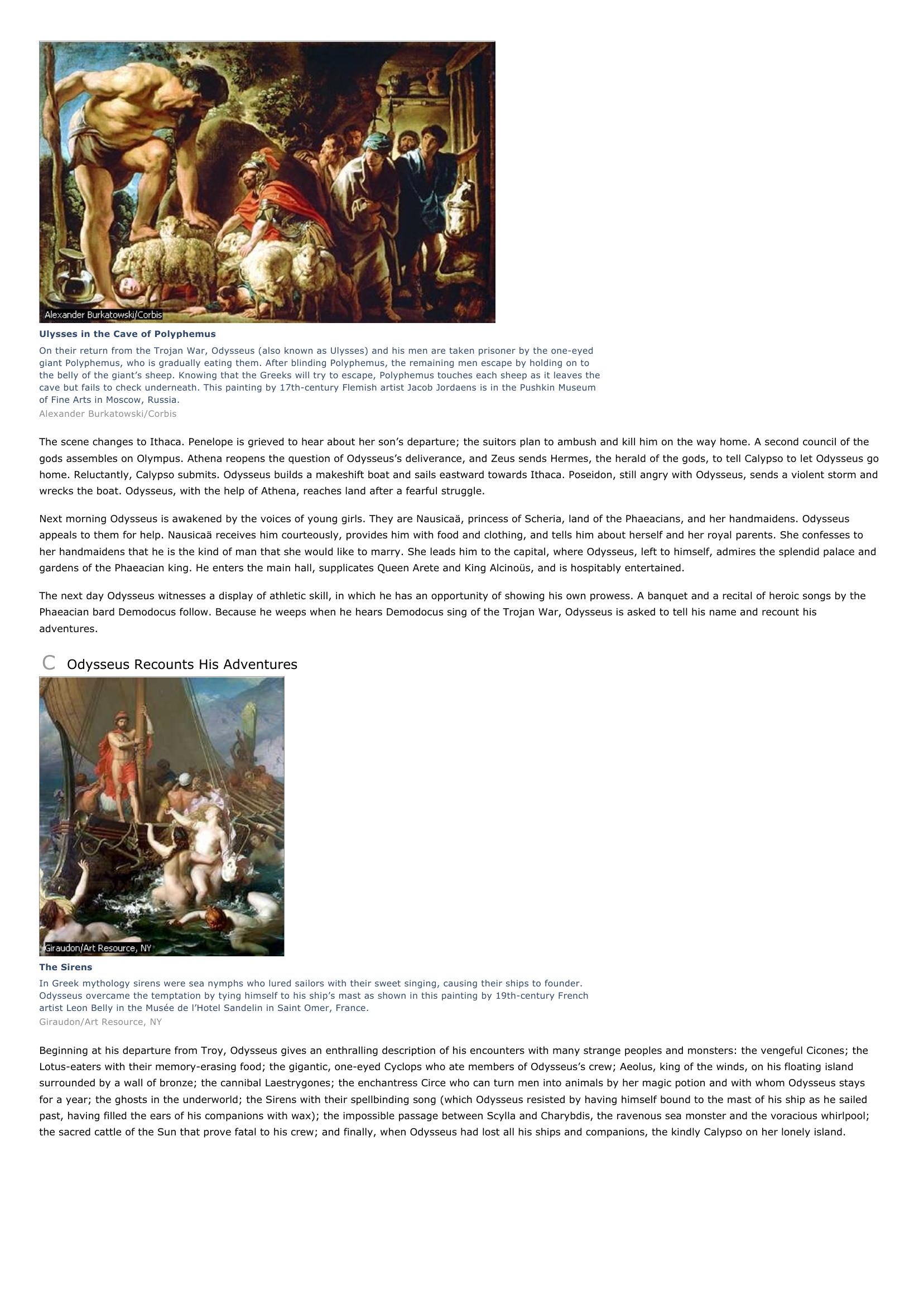Odyssey I INTRODUCTION Odyssey, ancient Greek epic poem in 24 books attributed to the poet Homer.
Publié le 12/05/2013

Extrait du document
«
Ulysses in the Cave of PolyphemusOn their return from the Trojan War, Odysseus (also known as Ulysses) and his men are taken prisoner by the one-eyedgiant Polyphemus, who is gradually eating them.
After blinding Polyphemus, the remaining men escape by holding on tothe belly of the giant’s sheep.
Knowing that the Greeks will try to escape, Polyphemus touches each sheep as it leaves thecave but fails to check underneath.
This painting by 17th-century Flemish artist Jacob Jordaens is in the Pushkin Museumof Fine Arts in Moscow, Russia.Alexander Burkatowski/Corbis
The scene changes to Ithaca.
Penelope is grieved to hear about her son’s departure; the suitors plan to ambush and kill him on the way home.
A second council of thegods assembles on Olympus.
Athena reopens the question of Odysseus’s deliverance, and Zeus sends Hermes, the herald of the gods, to tell Calypso to let Odysseus gohome.
Reluctantly, Calypso submits.
Odysseus builds a makeshift boat and sails eastward towards Ithaca.
Poseidon, still angry with Odysseus, sends a violent storm andwrecks the boat.
Odysseus, with the help of Athena, reaches land after a fearful struggle.
Next morning Odysseus is awakened by the voices of young girls.
They are Nausicaä, princess of Scheria, land of the Phaeacians, and her handmaidens.
Odysseusappeals to them for help.
Nausicaä receives him courteously, provides him with food and clothing, and tells him about herself and her royal parents.
She confesses toher handmaidens that he is the kind of man that she would like to marry.
She leads him to the capital, where Odysseus, left to himself, admires the splendid palace andgardens of the Phaeacian king.
He enters the main hall, supplicates Queen Arete and King Alcinoüs, and is hospitably entertained.
The next day Odysseus witnesses a display of athletic skill, in which he has an opportunity of showing his own prowess.
A banquet and a recital of heroic songs by thePhaeacian bard Demodocus follow.
Because he weeps when he hears Demodocus sing of the Trojan War, Odysseus is asked to tell his name and recount hisadventures.
C Odysseus Recounts His Adventures
The SirensIn Greek mythology sirens were sea nymphs who lured sailors with their sweet singing, causing their ships to founder.Odysseus overcame the temptation by tying himself to his ship’s mast as shown in this painting by 19th-century Frenchartist Leon Belly in the Musée de l’Hotel Sandelin in Saint Omer, France.Giraudon/Art Resource, NY
Beginning at his departure from Troy, Odysseus gives an enthralling description of his encounters with many strange peoples and monsters: the vengeful Cicones; theLotus-eaters with their memory-erasing food; the gigantic, one-eyed Cyclops who ate members of Odysseus’s crew; Aeolus, king of the winds, on his floating islandsurrounded by a wall of bronze; the cannibal Laestrygones; the enchantress Circe who can turn men into animals by her magic potion and with whom Odysseus staysfor a year; the ghosts in the underworld; the Sirens with their spellbinding song (which Odysseus resisted by having himself bound to the mast of his ship as he sailedpast, having filled the ears of his companions with wax); the impossible passage between Scylla and Charybdis, the ravenous sea monster and the voracious whirlpool;the sacred cattle of the Sun that prove fatal to his crew; and finally, when Odysseus had lost all his ships and companions, the kindly Calypso on her lonely island..
»
↓↓↓ APERÇU DU DOCUMENT ↓↓↓
Liens utiles
- Homer I INTRODUCTION Homer According to tradition, the Greek poet Homer is believed to be the author of the Iliad and the Odyssey, two great epics of ancient Greek literature.
- Odyssey Greek The epic poem by Homer that describes the adventures of Odysseus on his homeward voyage to Ithaca after the Trojan War.
- Homer I INTRODUCTION Homer, the name traditionally assigned to the author of the Iliad and the Odyssey, the two major epics that have survived from Greek antiquity.
- Lotus-Eaters (Loto phagi) Greek In Homer's Odyssey, people who lived on the fruit or the roots of the lotus plant.
- Polyphemus Greek The savage, one-eyed giant of Homer's Odyssey.





